When first setting up a website, figuring out the appropriate type of hosting for your needs can be a struggle. There are many types available ranging from shared hosting to dedicated servers. But what we’re going to focus on here today are two choices that most WordPress users will face. The decision between shared hosting vs managed WordPress hosting.
This article will focus on the features managed WordPress hosting and shared hosting offer, their pros and cons, and how to make a decision as to which is right for your situation.
But first, some definitions.
What is Managed WordPress Hosting?
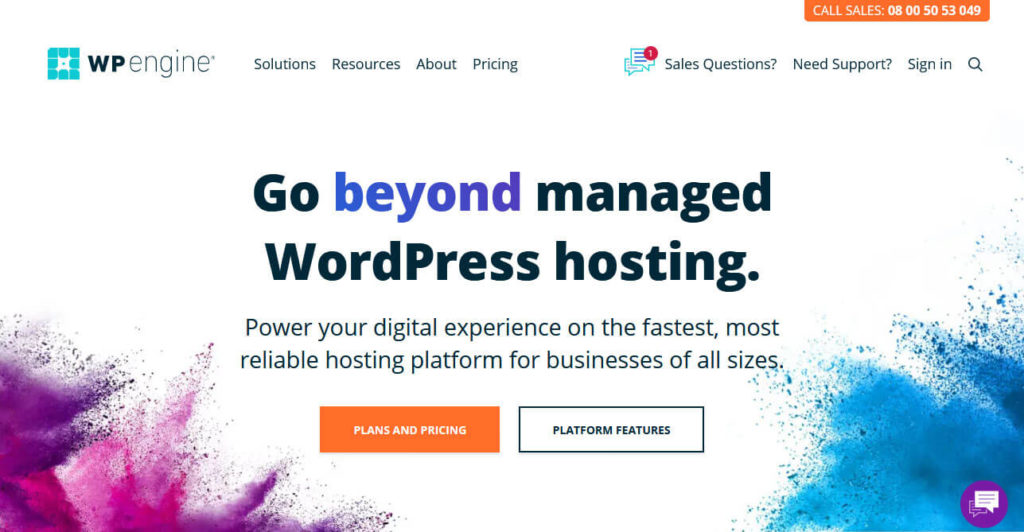
To put it plainly, managed WordPress hosting is exactly as its name implies: a hosting provider that offers WordPress website management on top of standard hosting services. Basically, you get custom-tailored service for your website, which involves most general technical upkeep, installation, and security tasks. The idea here is to offer full support so that website owners have more time for other business-related tasks.
What is Shared Hosting?
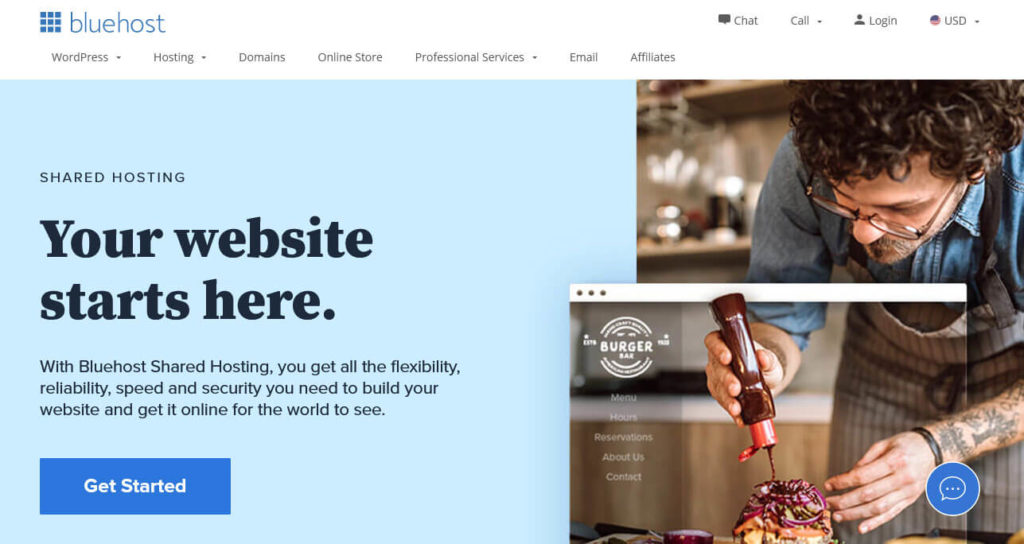
Shared hosting is what people often envision when they think of web hosting. This service provides space on a server for hosting your website. It can be based on WordPress or any other CMS you want but you’re responsible for its installation, setup, and maintenance. It typically does not offer expert support but is much more inexpensive.
Managed WordPress Hosting vs. Shared Hosting: Where Do They Shine?
Now that you know what we mean by managed WordPress hosting and shared hosting, we can shift our discussions to talking about the benefits of each and why you might consider them.
Benefits of Managed WordPress Hosting
As you might expect, managed WordPress hosting offers a wide range of features tailor-made to WordPress users — prolific WordPress users, specifically. If you have a larger website, run an online store, or have your hands full with a lot of other business related tasks, a managed approach can work out well for you. But enough prefacing. Let’s get down to the details.
Servers Optimized for WordPress Specifically
With managed hosting, you’ll find that the server on which your site lies is optimized for WordPress specifically. This means that all settings work at an ideal capacity for WordPress and WordPress alone. Managed plans provide faster load times and overall improved website performance for your visitors.

Custom-Tailored Support
As with server settings, support aims specifically at WordPress users. That means the support staff typically consists of WordPress experts who can troubleshoot and solve site issues with greater speed and ease than what you’d experience with typical shared hosting support. Plus, since the hosting provider only deals with WordPress sites, you’re going to get a higher-quality customer support experience with more precise answers to your questions.
Security on Point
On another related note, security for your WordPress website will be much more thorough with managed hosting because of WordPress-specific server optimization. So, best practices for beating malware, hacking, and other security issues as they relate to WordPress will be accounted for. No other CMS or site types are present on these platforms, so there is no need to strike any middle ground or compromises. You can count on the latest WordPress security measures to be in place.
Automatic Updates and Backups
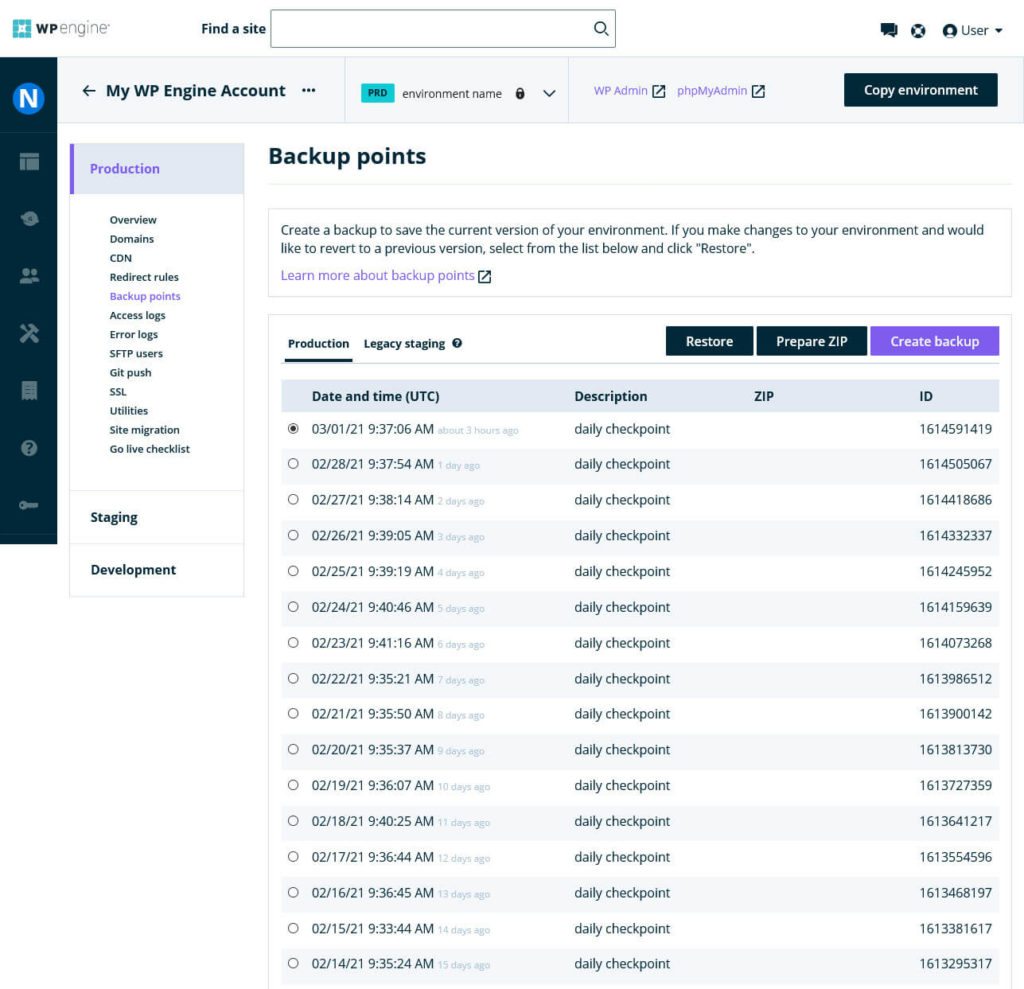
One of the biggest benefits of managed WordPress hosting is how little work you have to do to maintain it. WordPress Core, plugin, and theme updates along with site backups happen automatically. You only need to select options for their frequency and the hosting provider takes care of the rest for you. As it pertains to Core updates, you sometimes might not have a say in when updates roll out, as the host will perform them on a predetermined schedule. This helps to maintain site and server security to the best of their ability.
(By the way, you can have automatic updates on your non-manages site as well. Learn about it here.)
Maintenance Tasks Taken Care of for You
Other site maintenance tasks happen automatically as well. You really don’t need to lift a finger when it comes to maintaining your WordPress site. All you’re responsible for is populating it with content.
CDN Often Included
A content delivery network can go a long way toward speeding up your site’s performance. And lucky for you, managed hosting most often comes with a CDN.
Less Downtime
Since managed WordPress hosting revolves around WordPress, it’s optimized to maintain uptime. So, you’ll find that managed providers can guarantee a lower rate of downtime than shared hosting providers can promise where way too many variables are in play.
Staging and Local Environments
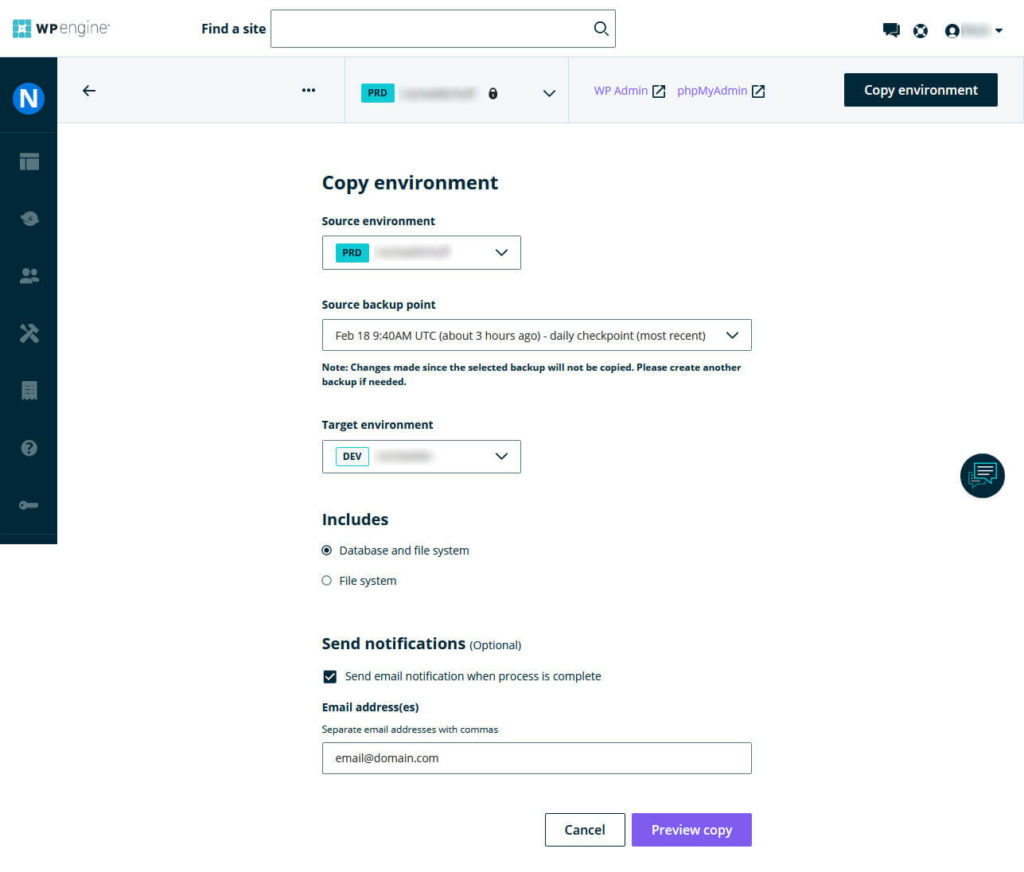
Easy-to-set-up staging and development sites are often part of the deal. This is super helpful for developers who need easy access to safe environments for conducting tests. They make it much easier to test plugins, themes, or site mockups without putting your live site at risk.
Development Tools Included
Often, managed hosting plans also come with a greater number of dev tools, allowing you to view error logs, clear the cache, manage the site database and more. Plus, you can turn on and off access to these tools based on your needs and technical know-how.
Benefits of Shared Hosting
Shared hosting does offer a good number of perks as well. Let’s break them down.
Affordable
Where shared hosting will always win vs managed WordPress hosting is the price point. It’s very affordable and within range for most people. A lot of plans are only a couple of dollars per month, meaning a hosting plan is easy to budget for. This makes starting a new website an attainable proposition for most people.
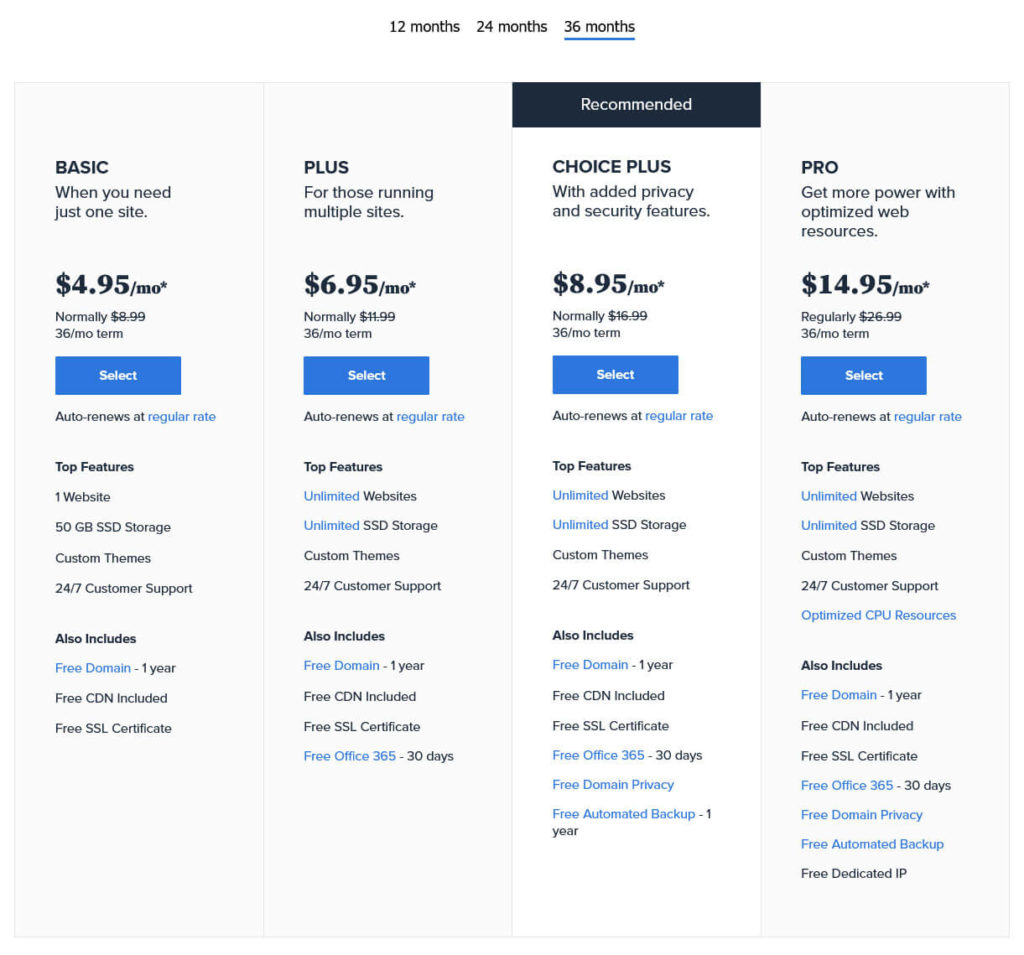
Unlimited Bandwidth and Storage
While there is truly no such thing as real “unlimited” bandwidth and storage, you do get a whole lot of it with shared hosting plans. Resources are abundant and since custom-tailored services aren’t part of the deal, you do get more in storage space and bandwidth than you would with a managed host — especially for the price.
Greater Control Over Your Hosting Experience
If you’re a true do-it-yourselfer, then you’ll appreciate what shared hosting offers. You have to do everything yourself, from installing WordPress to configuring your server, to setting up your domain name. If you want to change server settings, you have to handle that on your own as well.

In addition, you manage all WordPress updates for the core, themes, and plugins and have to manually set up backups (though this is a process that you can achieve via third-party plugins). Everything about your website will be as you determine it to be. It also means you have greater flexibility over which plugins and tools you use.
Includes Email
Most shared hosting providers include at least one email address and email hosting to use in conjunction with your web host and domain. This is definitely a worthwhile convenience.
Host Different Types of Websites
Lastly, opting for a shared hosting plan means you determine what type of site you host. Yes, you can set up and use WordPress but you can also use any other CMS you’d like from Joomla to Drupal. Or, you can manually code your website entirely from scratch if you’d prefer. What you say goes, here.
Managed WordPress Hosting vs. Shared Hosting: The Drawbacks
It can’t all be rosy. You can’t make an informed decision without going over the downsides of both these hosting types. Let’s explore that now.
Cons of Managed WordPress Hosting
Though managed WordPress hosting often proves to be well worth it for developers and established businesses, it’s not without its drawbacks.
High Price Tag
The cost of managed WordPress hosting can be quite prohibitive for startups and those on a tight budget. It is often three to five times the cost of shared hosting plans. While you do get a broad range of additional maintenance features, it also doesn’t come with some of the features you’d get readily with a shared plan.
Site Maintenance is Out of Your Hands
This includes things like updates, backups, and server side configurations. Of course, this can also be one of the massive benefits of managed hosting. However, if you like getting your hands dirty with code or solving problems on your own — and you have the luxury of time to invest in that pursuit — managed hosting might not be the right choice for you.
Less Freedom Overall
Managed hosting providers offer a great level of security to its users. To achieve this, they often restrict which plugins you can install on their servers. Here is an example from WP Engine:
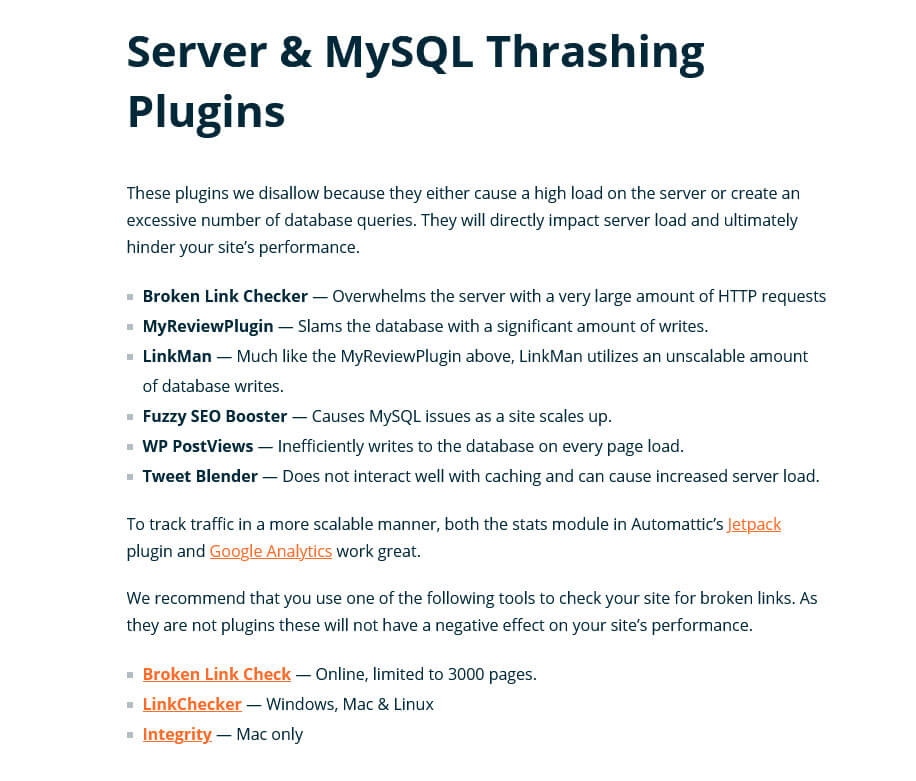
Again, this restriction is in your best interest but it can, at times, cause issues with making customizations or installing perfectly serviceable plugins.
Email Not Included
Many managed hosts don’t include email, which means you have to source that elsewhere. It’s not the end of the world but the lack of this convenience could be a dealbreaker for some.
Limited to WordPress Only
Perhaps this should go without saying, but these hosting providers are limited to hosting WordPress sites only. With their expert staff and so many maintenance tasks handled for you, it would only result in a reduction in service quality if they were to host other CMS types.
Cons of Shared Hosting
Shared hosting can bring issues along with it as well. Let’s dive into those before we wrap up here.
Shared Resources
As its name implies, shared hosting means you share a server with other websites, so if one site is a server hog, your site can suffer.
Overloaded Servers
The low prices offered by shared hosting are undoubtedly alluring, but they do come — if you’ll pardon the pun — at a price. Low price points are only available because servers the fill their servers to the brim.

And while many shared hosts are great at managing this, sometimes servers can get overloaded and that results in slower site speeds for you.
Pricing Can Be Misleading
Shared hosting is pretty inexpensive across the board. But often the super low prices advertised are a bit misleading and reflect promotional prices only.
For instance, you may see that a host offers plans for $3/month but in reality that price is only valid if you purchase an entire year of hosting upfront. In addition, many shared hosting contracts renew at a higher price then the initial offer.
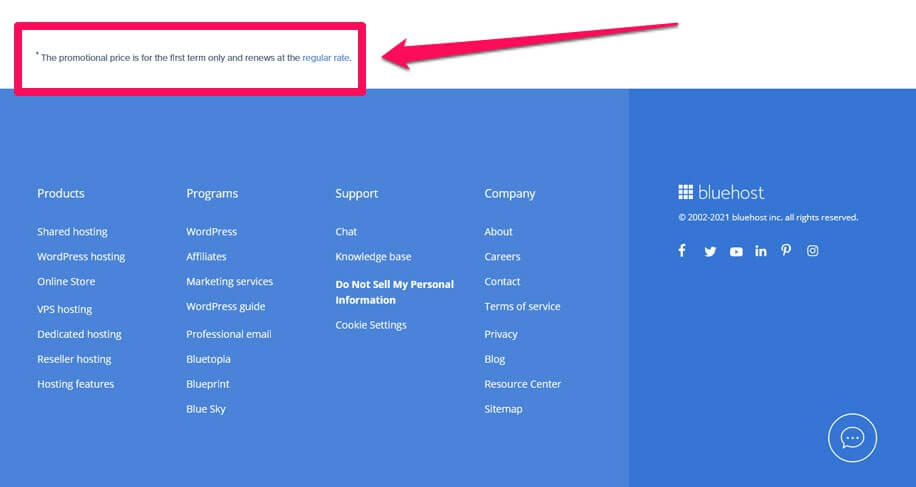
Slower Site Speeds
Site speeds are generally slower with shared hosting than they would be with a managed WordPress host. This is a direct result of the shared resources we discussed earlier. It can result in an increased bounce rate, especially for larger sites or those within the eCommerce space.
You Have to Manage Everything Yourself
The biggest drawback of shared hosting (by far) is the fact that you have to do everything yourself. Your mileage may vary, of course, but if your time is limited, having to manage WordPress core updates, plugin and theme updates, site backups, and server configurations all on your own can be overwhelming. This makes it more likely then that you won’t perform routine maintenance tasks as you should and that puts your site’s performance and security at risk.
Managed WordPress Hosting vs Shared Hosting: The Verdict
Deciding between managed WordPress hosting and shared hosting isn’t something to be taken lightly. It will affect your relationship with your website for a long time. Weighing the pros and cons of each can help you land on a decision that works for you. Managed WordPress hosting is generally a better choice as it includes more features, better security, and improved performance. Though if you’re on a tight budget, it may be out of reach.
Ultimately, you will need to look at your website needs and weigh them against your budget, tech skills, and projections regarding where you see your website in a few year’s time. Then, you can make a decision that will work for you in the long-term. Good luck!
Where do you stand on the discussion of managed WordPress hosting vs shared hosting? Share your thoughts in the comments!

No Comments
Start the conversation